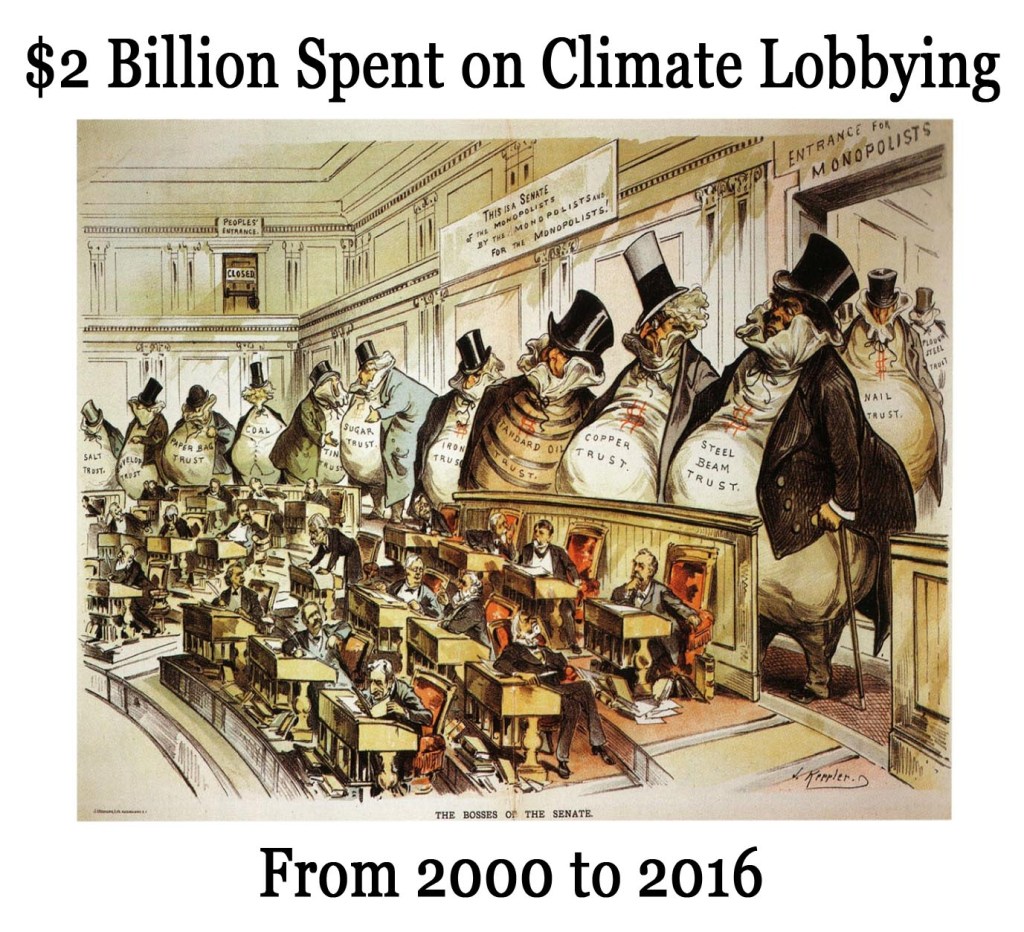
Nearly Two Billion Dollars spent on Anti-Climate Science Legislative Lobbying 2000 to 2016
Robert Brulle at Drexel University reminds us of what makes Congress work, “public opinion is only one, relatively minor input” into decisions made by Congress. (Grossmann 2014)
Data for Brulle’s latest work comes from the 1995 Lobbying and Disclosure Act that requires all lobbying efforts that take up more than 20 percent of the time be reported. Nearly 2 million records were evaluated from 1986 to 2016. Key words utilized in this study were: climate change, global warming, greenhouse, Keystone, renewable energy, carbon, clean energy, Kyoto, cap and trade, CAFE, fuel economy, and renewable electricity.
About $2.08 billion (in 2016 dollars) was spent on climate lobbying between 2000 and 2016. This is about 3.9 percent of total lobbying dollars spent of $53.5 billion. The electrical sector spent 26 percent of the total. The fossil fuel sector spent 17.7 percent, and the transportation sector 12.1 percent. The research also identified 231 different organizational types that do not fir into standard categories.
Brulle says that the “spending of environmental groups and the renewable energy sector is dwarfed by the spending of the electrical utilities, fossil fuel, and transportation sectors.” Lobbying expenditures from 2000 to 2016 for environmental and renewable energy groups amounted to only five to seven percent of the total, or less than $145 million.
An interesting note about lobbying goals was referenced from Brumbach 2015, where some players lobbied with “sophisticated strategies to simultaneously attempt to appear to support such [climate] legislation, while actually supporting efforts to undermine it.” Brulle notes, “as soon as the threat passed, lobbying for climate legislation by the corporations … ceased.”
Lobbying spending has not be the same over the years, but changed depending on different factors. Brulle’s work found, “Starting with the 109th Congress, there was a rapid increase in the number of hearings, bills introduced, and lobbying expenditures. This trend corresponded to the rise of concern over climate change associated with the release of Al Gore’s movie An Inconvenient Truth“
Brulle goes on, “The 110th Congressional session showed a fourfold increase in lobbying expenditures. With both the Senate and House in Democratic Party control, there was also a much larger number of bills
and hearings related to climate change. Climate lobbying expenditures doubled from their levels in the previous Congress with the 111th Congress. By this time, the Democratic Party controlled both houses, as well as the Executive Branch, and moved to fulfill its promise of passing climate legislation in this session. This session marks the peak of Congressional
attention to major climate legislation.”
And, ” Following this peak, the overall pace of Congressional activity related to climate change steadily decreased. The Republican Party captured the House of Representatives in 2010, and have held it ever since. This pattern
dramatically decreased the likelihood of meaningful climate legislation being passed.”
Interestingly, Brulle shows lobbying for and against climate legislation in this period was about evenly split, indicating that anti-climate change players were once again playing both sides of the discussion in an attempt to promote a false, or at least an unseeming support of climate legislation.
Brulle concludes, “The fact that the overwhelming amount of spending on lobbying was from corporations in the transportation, utility, and fossil fuel sectors has important implications for the fate of future climate legislation… This analysis also illustrates the limitations of science advocacy efforts. Climate lobbying expenditures by environmental organizations constitute only 3% of total lobbying expenditures… There is no open debate or refutation of viewpoints offered by professional lobbyists meeting in private with government officials. Hence, control over the nature and flow of information to government decision-makers can be significantly altered by the lobbying process, and creates a situation of systematically distorted communication.”
The Mother Ship:
Brulle,Institutionalizing delay, foundation funding and the creation of U.S. climate change counter-movement, Climatic Change, December 2013.
How to defeat the CCCM:
McKie, Climate Change Counter Movement Neutralization Techniques, Sociological Inquiry, June 2018. (Free subscription required)

